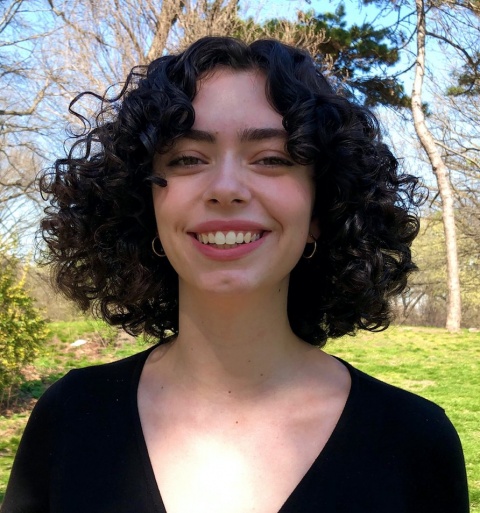Columbia College | Columbia University in the City of New York
’21 Salutatorian Found “A True Intellectual Community”

What were you like when you arrived at Columbia?
Very different, I think. My natural inclination was to be shy, but I felt a real sense of urgency to put myself out there in those early weeks — as if I had one shot to get the “college experience” that I had always hoped for, and I didn’t want to let it pass me by. (This is obviously not a reflection of reality, but I was 18 and neurotic and everything felt very all-or-nothing those days). I drank an obscene amount of coffee and Diet Coke, and I seldom slept.
Fortunately, I was quick to find community in my residence hall and on the board of The Columbia Review. It was all surreal at the time — the way things fell into place — and still feels that way to me now.
What do you remember about your first-year living situation?
I lived on John Jay 7, where I was lucky enough to find a great group of friends. Those are still some of my most vivid memories of the College — hanging out in the floor lounge for hours, arguing about books or education reform or the inevitable rise of AI-produced music, then returning, exhausted, to my single at 2:00 a.m. It was such a thrill to form those relationships early on, to feel so embraced and at home in my first weeks on campus.
What Core class or experience do you most remember, and why?
My most quintessential Core experience actually happened outside of the classroom, on my first-year floor. A few of us had gotten into a heated discussion about the Iliad — or, more specifically, whether or not Achilles was being “petty” in refusing to fight — and as the argument continued, we managed to ensnare nearly everyone on the floor. Picture it: Forty first-years yelling about Homer on a Wednesday night. Although I was alone in thinking that Achilles was a great existential hero, everyone defended their position with vigor — as if this was the first and last time this subject would ever be discussed, and that the outcome would uncover some important truth about the universe. You know, typical college stuff. I’ve told this story more times than I can count because it really is the apotheosis of what Columbia promises: a true intellectual community.
Did you have a favorite spot on campus, and what did you like about it?
I have always loved the trees in front of John Jay in the fall, and the saucer magnolias that bloom in the spring. Vladimir Nabokov said that one should not be a writer if they do not know the names of trees, so I try my best. Mostly, I find them entrancing — the way the light moves through their leaves. Watching the trees change with the seasons never fails to make me feel renewed.
Off campus, I frequently haunt The Hungarian Pastry Shop. They make my favorite cup of coffee, and a divine lemon cake. Philip and the rest of the Hungarian team are so kind, as well. My affection for the shop was the first thing that made me truly feel like a local, and I look forward to hustling for a table there again soon.
What, if anything, about your College experience would you do over?
In preparing these answers, I glanced at a few of the other profiles and noted that many people seem to share my desire to have had more time — more time in which to take more classes, befriend more people, attend more concerts and Broadway shows. I think that losing three semesters to the pandemic exacerbated this feeling in some ways. On the very morning that the College suspended its international programs, [Professor] Colm Tóibín agreed to supervise an independent research project I was planning to undertake in Barcelona. At the time, losing that trip was a massive disappointment for me. On the other hand, the pandemic allowed me to spend more time with my family, time that I have come to cherish (even though I wish, more than anything, it had been for different reasons). Even under normal conditions, there is never enough time to do all that we hope to do, but for every opportunity that I could have pursued, there is an experience that I am grateful to have had.

